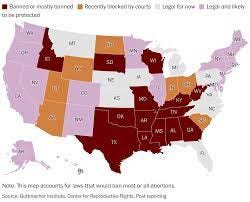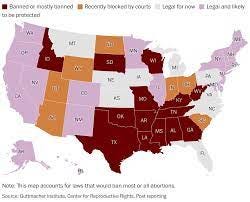Thirteenth Amendment Prohibits Restrictive Abortion Laws: A Constitutional Argument
Dobbs Only Ruled on the Fourteenth Amendment
As I have written in several prior Newsletters, there is a very substantial argument that the Thirteenth Amendment to the U.S. Constitution prohibits restrictive laws limiting a woman’s ability to obtain an abortion. To my knowledge, no one has raised this issue in any pending case, though I would be delighted to learn if anyone has done so.
The Dobbs decision was only decided under the Fourteenth Amendment. No Justice discussed the Thirteenth Amendment, and no party or amicus raised the Thirteenth Amendment as a basis for declaring Mississippi’s 15-week abortion restriction unconstitutional as a violation of that Amendment which prohibits not only slavery but also “involuntary servitude.” The Thirteenth Amendment argument is as follows: a state’s restrictive abortion law may make it impossible for many women to obtain an abortion due (1) to their lack of economic means to go to another state that would permit them to have an abortion at their stage in the pregnancy and (2) the restrictive abortion law may set a time limit that is so restrictive that it expires before a woman even knows she is pregnant or she is unable to secure an abortion because of the lack of availability of abortion providers anywhere near where she lives or many other reasons. In such circumstances, because of the state’s restrictive abortion law, a woman is unable to obtain an abortion and is forced by the state to continue the pregnancy to term and coerced by the state to go into labor and delivery. The state’s restrictive abortion law coerces the woman to continue the pregnancy when it may endanger her health, when she does not have the economic resources to properly care for a baby, or the pregnancy was the result of rape or incest.
The Supreme Court, in its most recent decision on the Thirteenth Amendment, United States v. Kozminski, 487 U.S. 931 (1988), held that if there is state coercion imposing substantial burdens on a person to do something they do not want to do, the state compulsion may constitute involuntary servitude. In the Kozminski case, Justice O’Connor, writing for the majority, held that when two mentally retarded individuals were forced by a landlord to engage in labor under difficult conditions and without nearly any compensation that amounted to involuntary servitude violating the Thirteenth Amendment. The principal issue in Kozminski was whether psychological compulsion alone was sufficient to establish a Thirteenth Amendment violation. But Justice O’Connor’s opinion did state that state coerced labor would clearly violate the Thirteenth Amendment. Justice Rehnquist joined Justice O’Connor’s opinion, and Justices Brennan, Marshall, Stevens and Blackmun wrote opinions concurring in the judgment. That is a rather impressive list of Justices stating that state coercion of labor could violate the Thirteenth Amendment.
In the context of abortion, a state’s restrictive abortion law may coerce a woman to go into labor and delivery, even though it is against her will, as she wanted an abortion earlier in her pregnancy but could not obtain one, for various of the above-cited reasons, due to the state’s restrictive abortion law. As such the state’s restrictive abortion law may amount to the imposition of involuntary servitude violating the Thirteenth Amendment by coercing the woman to do something against her will, namely complete the pregnancy and go to term despite the substantial burdens it has and will impose upon her.
The Respondents in Dobbs, i.e. the Jackson Women’s Clinic, had the opportunity to raise the Thirteenth Amendment issue in a petition for rehearing, but they chose not to do so. The plaintiffs in Sistersong Women of Color Reproductive Collective v. Governor of Georgia, No. 20-13024 (11th Cir. 2022), had challenged the Georgia 6-week restriction on abortion, a timeframe when many women would not even know they were pregnant, but after the decision in Dobbs, the Eleventh Circuit held that the Georgia 6-week limit (the fetal heartbeat rule) on abortion was constitutional citing the decision in Dobbs overruling Roe and Casey. The plaintiffs in Sistersong could have filed a Petition for a Writ of Certiorari in the Supreme Court to raise the Thirteenth Amendment issue, but they chose not to do so.
Instead, the plaintiffs in Sistersong filed an action in the Fulton County, Georgia Superior Court entitled Sistersong Women of Color Reproductive Justice Collective v. State of Georgia, Case No. 2022CV367796, where they sought a temporary restraining order, a preliminary injunction and a declaratory judgment that the Georgia “LIFE Act” imposing the 6-week abortion restriction, was a violation of the Georgia Constitution as an infringement on the right to privacy. That privacy right in Georgia arose from a 1905 Georgia Supreme Court decision, Pavesich v. New England Life Insurance, 122 Ga. 190, 50 S.E. 68 (1905), and several subsequent cases. The Fulton County Court held a two-day hearing on the plaintiffs’ motions as well as Georgia’s motion to dismiss, but on August 15, 2022, presiding Judge Robert McBurney denied the plaintiffs’ Motion for a Preliminary Injunction against the LIFE Act holding that Georgia had not waived sovereign immunity. The Court did state in a footnote that sovereign immunity does not bar injunctive and declaratory relief against state officials in their individual capacity, but here plaintiffs had sued the State of Georgia. The Court also said in another footnote “that there are other important constitutional questions involved” in the case. The plaintiffs in Sistersong proceeded to a trial on the merits ending on or about October 25, 2022, and the case is pending a final ruling on various constitutional issues by Judge McBurney.
Other cases challenging state restrictive abortion laws are pending in North Dakota, South Carolina, Louisiana, Florida. Arizona, Texas, Mississippi and Oklahoma. Each of these cases assert that restrictive state abortion bans or limitations violate provisions of the respective state constitutions or laws.
Though I have not seen any federal or state cases raising the Thirteenth Amendment issue, there is an abundance of academic literature and other commentary discussing the Thirteenth Amendment as it may affect state abortion laws. One very significant source is the book by Pamela D. Bridgewater, entitled “Breeding a Nation: Reproductive Slavery, the Thirteenth Amendment, and the Pursuit of Freedom” (South End Press 2014). That book is discussed in an article by Dov Fox, a Professor of Law and Director of the Center for Health Law Policy and Bioethics at the University of San Diego School of Law, in an article entitled, “Thirteenth Amendment Reflections on Abortion, Surrogacy and Race Selection” found at live-cornell-law-review.pantheonsite.io, Vol. 104 Cornell Law Review Online 114. In that article, Professor Fox states, “A handful of scholars— Loretta Ross, Laura Sjoberg, Laurence Tribe, Norman Vieria— have endorsed the view that severe abortion constraints amount to ‘involuntary servitude.’” A strong argument applying the Thirteenth Amendment to abortion restrictions was made by Andrew Koppelman in an article entitled, “Forced Labor: A Thirteenth Amendment Defense of Abortion,” 84 Nw. U. L. Rev. 480 (1990). In a post-Dobbs Guest Essay in the New York Times of June 26, 2022, Michele Goodwin, a professor of law at the University of California, Irvine, entitled, “No, Justice Alito, Reproductive Justice is in the Constitution,” she makes the argument that forced or compulsory completion of pregnancy to term violates the Thirteenth Amendment.
Then there is an article by Laura Sjoberg, a professor at the University of Florida and a Research Fellow at the Kennedy School of Government at Harvard, entitled “Where Are The Grounds for the Legality of Abortion? A Thirteenth Amendment Argument”, in 17 Cardozo J. L. & Gender 527 (2010), where Professor Sjoberg makes the Thirteenth Amendment argument. Then there is an article by Jamal Greene, a professor of law at Columbia Law School, entitled “Thirteenth Amendment Optimism,” 112 Colum. L. Rev. 1733 (2012), where he analyzes the various arguments applying the Thirteenth Amendment to abortion restrictions but ends up concluding that the argument may be more effective politically than in a judicial setting.
Also of interest is the testimony by Professor Michele Bratcher Goodwin, a professor at the University of California, Irvine and a Senior Lecturer at the Harvard Medical School, Center for Medical Ethics, before the House Oversight Committee, entitled, “The Impact of the Supreme Court’s Dobbs Decision on Abortion Rights and Access Across the United States,” where she makes the argument that severe abortion restrictions violate the Thirteenth Amendment, at oversight.house.gov (July 11, 2022).
So, there is academic and political commentary supporting a Thirteenth Amendment argument against severe abortion restrictions, such as the Georgia and South Carolina 6-week limitations. The beauty of the Thirteenth Amendment Argument is that it does not have to rely on a right of privacy nor do we have to search through penumbras to find the right. Rather, it sits boldly in the Constitution and has text that even the textualists on the courts can understand. Though the Supreme Court was quite clear in Dobbs that there was no Fourteenth Amendment right to invalidate restrictive abortion provisions, the fact that there has been no consideration of the effect of the Thirteenth Amendment on abortion restrictions leaves open the possibility that even this Supreme Court could invalidate the Georgia and South Carolina 6-week restrictions or the total bans being enacted by some states.
Chief Justice Roberts was looking for another vote to adopt a middle ground position upholding the Mississippi 15-week restriction but leaving Roe and Casey intact, but he could not get another vote from the Alito Five. But would Roberts and Kavanaugh be willing to apply the Thirteenth Amendment to abortion restrictions? It is possible. It would give them an alternative argument, not decided before, to apply a non-absolutist restriction on state abortion legislation. Would Jackson, Kagan and Sotomayor agree to a Thirteenth Amendment restriction on state abortion limits? I am fairly sure they would since the result would be subject to a new standard for review of abortion restrictions, and one they could help formulate, and a far better holding than the Dodds complete abandonment of Roe and Casey.
The mid-term elections show that a large majority of people, both Republican and Democrat, support the availability of abortion but subject to various conditions and time frames. What happens when six politicians in black robes adopt a NEW interpretation of the Fourteenth Amendment inconsistent with fifty years of judicial precedent and inconsistent with the views of a majority of voters? Is the ruling in Dodds one in which we owe respect in light of these six Justices’ deviation from precedent and the majority views of voters? Is their political, and some would say, religious holding, one we are forced to obey? Could Dodds be overturned by a Thirteenth Amendment argument? I think so. But someone needs to try or we will never know.




